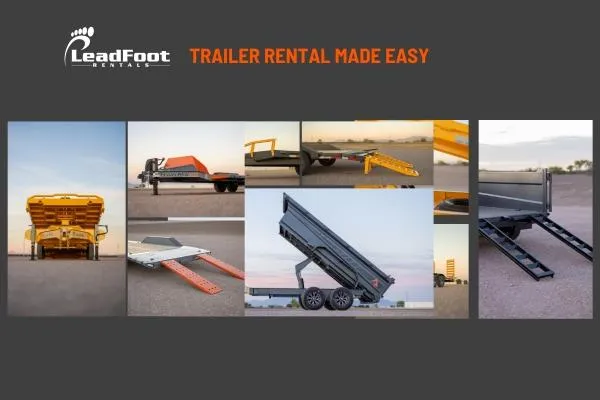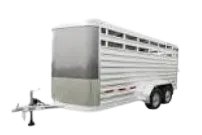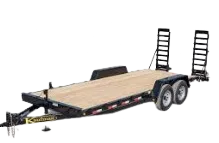Leadfoot Rentals | Blog

Essential Trailer Maintenance Tips Every Customer Should Know Before Renting

Routine Trailer Maintenance: The Ultimate Guide for Safe and Reliable Towing
If you're a trailer owner or renter, regular maintenance is the key to ensuring your trailer remains safe, reliable, and ready for any job. Whether you’re hauling equipment, livestock, or recreational vehicles, this guide will walk you through everything you need to know about maintaining your trailer. From tire inspections to brake checks, we cover all the essential steps to keep your trailer in top shape.
At Leadfoot Rentals, we prioritize safety and performance in all our trailer rentals. With a fleet of meticulously maintained trailers, you can trust us for your next hauling project.
Why Routine Maintenance is Crucial for Trailers
Trailers endure significant stress, especially under heavy loads or during long-distance towing. Proper maintenance helps you avoid costly repairs, reduce the risk of accidents, and extend the lifespan of your trailer. It also ensures optimal towing performance, giving you peace of mind on every trip.
Key Benefits of Regular Trailer Maintenance:
Enhanced Safety: Prevents breakdowns and accidents caused by faulty components.
Cost Efficiency: Identifies and addresses small issues before they turn into major repairs.
Increased Longevity: Protects your investment by extending your trailer's service life.
Reliable Performance: Ensures smooth towing and better fuel efficiency.
Step-by-Step Trailer Maintenance Checklist
1. Tire Maintenance: A Foundation for Safety
Tires are one of the most critical components of any trailer. Here's how to keep them in great condition:
Check Tire Pressure Regularly: Underinflated or overinflated tires can lead to blowouts or uneven wear. Use a reliable tire pressure gauge to ensure your tires meet the manufacturer’s recommended PSI.
Inspect Tread Depth and Wear: Bald spots or uneven tread wear can indicate alignment or suspension problems that need immediate attention.
Carry a Spare Tire: Always have a fully inflated spare tire that matches your trailer's tires, along with the tools to change it.
2. Brake System Maintenance
Your trailer’s braking system is vital for safety, especially when hauling heavy loads. Follow these steps to keep it in optimal condition:
Inspect Brake Pads and Rotors: Look for wear, cracks, or scoring. Replace them as needed.
Test the Brake Controller: Ensure the controller is calibrated correctly for smooth and consistent braking.
Check Brake Fluid Levels: Low or dirty brake fluid can reduce braking performance. Top it off with the recommended type of fluid.
3. Lights and Electrical Systems
A functioning lighting system keeps you visible and compliant with road laws. Here’s what to check:
Brake Lights and Turn Signals: Test all lights before every trip to ensure they’re working properly.
Wiring Connections: Look for frayed wires, corrosion, or loose connections that could disrupt power.
Battery Health: If your trailer has auxiliary systems, ensure the battery is charged, and clean the terminals regularly.
4. Hitch and Coupler Maintenance
The hitch and coupler are the connection points between your trailer and tow vehicle. Regular inspections ensure a secure connection:
Inspect for Damage: Check for cracks, rust, or deformations in the hitch or coupler.
Lubricate Moving Parts: Reduce friction and wear by applying high-quality grease.
Secure Bolts and Pins: Tighten all bolts and pins to prevent accidents during towing.
5. Axle and Suspension Care
Axles and suspension systems support your trailer’s load. Ensure they’re in top condition with these steps:
Check Axle Alignment: Misaligned axles can cause tire wear and unstable towing.
Inspect Leaf Springs and Shackles: Look for cracks, rust, or broken components that need replacement.
Lubricate Suspension Joints: Use grease to ensure smooth movement and reduce noise.
6. Cleaning and Corrosion Prevention
A clean trailer lasts longer and performs better. Here’s how to maintain its appearance and functionality:
Wash After Every Use: Use a high-pressure washer to clean dirt, road salt, and grime from the exterior, especially the undercarriage and wheel wells.
Sanitize the Interior: For livestock trailers, disinfect the interior to prevent rust and bacteria buildup.
Apply Protective Coatings: Use rust inhibitors and wax to shield metal surfaces from corrosion.
Suggested Maintenance Schedule
Tire Pressure Checks: Before every trip. Use a reliable tire pressure gauge.
Brake Inspections: Monthly or before long trips. Test functionality and pad condition.
Lights and Electrical Tests: Before every trip. Replace bulbs and fix wiring as needed.
Hitch and Coupler Inspection: Monthly. Lubricate and check for signs of wear.
Axle and Suspension Check: Every 3 months or 5,000 miles. Grease joints and inspect alignment.
Thorough Cleaning: After every use. Focus on corrosion-prone areas.
Tools You’ll Need for Routine Maintenance
Having the right tools makes maintenance easier and more effective. Equip yourself with:
Tire pressure gauge
Torque wrench
Grease gun
Multimeter for electrical diagnostics
Socket set
Trailer Maintenance: Your Investment in Safety and Performance
Routine maintenance is essential for safe and efficient towing, whether you're using a trailer for work or recreation. By following these steps, you’ll ensure your trailer is always in peak condition, saving time and money in the long run.
At Leadfoot Rentals, we provide trailers that are meticulously maintained and ready for your next job. Contact us for expert advice or to rent a trailer that suits your needs.
📱Call us at: (346)590-2610
📲Prefer Text? Message us for a quicker response
🛜Visit us at: Leadfoot Rentals








